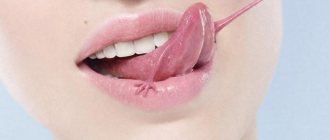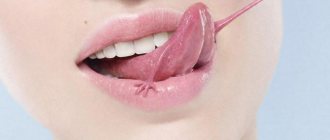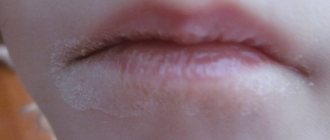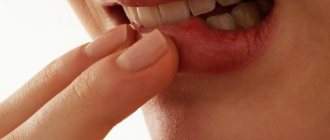Causes of cheilitis
The inflammatory process can begin for multiple reasons. One of the most common of them is mechanical injuries: for example, accidental biting can cause inflammation.
The development of the disease can also be provoked by:
- unfavorable environment (people who spend a lot of time outdoors and are exposed to wind, frost and other weather conditions are more likely to suffer from cheilitis);
- aggressive action of cosmetics or an allergic reaction to some of their components;
- lack of vitamin B2, which is responsible for the division and growth of epithelial cells;
- diseases of the gastrointestinal tract, liver, lack of immunity.
Top 10 tips on how to care for your lips
To keep your lips smooth and hydrated, follow these tips:
- Regularly exfoliate the skin of your lips with special scrubs or a damp, thick towel.
- Moisturize and nourish your lips with herbal balms; in the summer, you should additionally use products with SPF filters.
- Maintain a drinking regime of drinking 2 liters of clean water per day.
- Include in your diet foods high in omega-3 fatty acids (nuts, vegetable oils, vegetables and herbs, fatty fish).
- Stop smoking, as tobacco smoke dries out the thinnest skin of the lips and leads to the formation of purse-string wrinkles.
- Wash off makeup not with soap, but with two-phase makeup removers. In addition, while washing your face, it is good to do simple exercises to strengthen the orbicularis oris muscle. It is necessary to tightly compress and unclench your lips, and also pronounce the letters A, O, U, Y.
- Take complexes containing vitamins A, C, E and group B.
- Apply only high-quality cosmetics to your lips that do not contain camphor, phenol, aniline dyes and heavy metal salts.
- It is recommended to add lip masks to winter care, or replace them by applying a restorative cream at night.
- It is important to remember that cosmetic procedures play a huge role in maintaining external beauty. Therefore, do not forget about professional salon care for thin and delicate lip skin.
Types of the disease, their symptoms
There are a large number of types of disease, each of which has its own symptoms. Cheilitis happens:
- catarrhal, resulting from injury. Its characteristic symptoms are redness, peeling, swelling and soreness of the lips.
- eczematous, developing due to the occurrence of eczematous processes. The reason is an allergy to a certain type of food, cosmetics (lipstick, cream).
- glandular, associated with an abnormality of the salivary glands. It happens that cheilitis on the lips accompanies periodontal disease, lupus, etc. The lower lip often suffers and begins to peel.
- meteorological. It is caused, as the name suggests, by weather conditions (high air humidity, strong wind, decreased or increased temperature, exposure to ultraviolet radiation, etc.).
- exfoliative, characterized by a chronic course. It is divided into two forms - dry (the blood supply to the lips is disrupted and, as a result, dry scales are formed, which can be easily removed, but after a few days they appear again) and exudative (the border swells and becomes inflamed, crusts appear).
- angular, called jam. Due to streptococci, inflammation begins in the corners of the lips. Vitamin deficiency and frequent licking of lips can also provoke it.
- atopic, accompanying atopic dermatitis. The red border of the lips flakes and itches, the lips crack.
- hypovitaminosis, which occurs due to a lack of B vitamins. Dryness and a pronounced burning sensation affect not only the lip area, but also the entire mucous membrane of the mouth, including the tongue. In this case, the mucous membrane turns red, and vertical cracks form in the area of the red border.
Regardless of the type of cheilitis, common symptoms will be:
- peeling of the lips, observed both only near the border and over the entire surface;
- swelling and swelling, burning and itching in the lips, the appearance of cracks and crusts on them.
What should healthy lips look like?
Those who know how to moisturize their lips can boast of their naturally beautiful appearance. The natural red hue is due to the location of blood vessels near the surface.
Signs of healthy lips:
- smooth skin;
- smooth texture;
- pleasant natural shade;
- no peeling or cracking.
Healthy lips have even, uniform pigmentation without light or dark areas. Healthy skin looks elastic, it is not prone to irritation, peeling and allergies.
If a whitened area is detected, it means that the delicate skin does not receive enough hydration or there are not enough vitamins in the body:
- A,
- E,
- WITH.
First you need to learn how to use the right cosmetics. This applies to all people, because even if there are no problems with the lips, a careful attitude will not be superfluous.
You need to be able to choose the right cosmetics. And the first thing people pay attention to is the composition. Oil-based products should contain only natural ingredients:
- jojoba oil,
- cocoa,
- shi,
- nut oils.
It is best to buy products at a pharmacy or labeled “pharmacy product”. This means that cosmetics:
- passed dermatological tests,
- approved by experts
- considered safe.
In addition to moisturizers, there are small life hacks to improve the color and contour of your lips.
Shock freezing is often used: using ice to massage the lips. With prolonged exposure to cold, the appearance of the lips deteriorates, but short periods of exposure to shock cold cause the capillaries to expand sharply. Blood flows closer to the skin and provides:
- more active saturation with oxygen and nutrients,
- more saturated lip color.
The most common advice for lip care is the use of special lipstick. But there are several ways to moisturize your lips without chapstick.
Cheilitis in children
Depending on the age of the child, he may experience a certain type of cheilitis.
Newborns suffer from a catarrhal disease caused by the prolonged presence of a pacifier or bottle in the mouth. Plus, saliva accumulates on the nipples of the lips, irritating sensitive baby skin.
If the disease is ignored, hoping that it will go away on its own, cheilitis will develop into an exfoliative form, accompanied by the formation of scales, which the child will not be able to remove himself (parents are highly discouraged from interfering in this process, since attempts to tear off the crusts can cause cracks, which will only aggravate the situation ).
Constant sucking of the mother's breast is an equally common cause of the development of the disease: during feeding, cracks form on the nipples, into which bacteria penetrate, which causes cheilitis.
Why do lips dry out?
Before looking for a way to quickly moisturize your lips, you should find out the cause of the problem. Depending on what formed the basis for the lack of moisture, you can choose a suitable remedy for complete restoration.
Causes of dry lips:
- Harmful environment. Cold, heat, windy weather and poor air quality. Cold and heat provoke a decrease in moisture in tissues. The condition worsens during strong winds.
- Stress. Situations when a person is very nervous and involuntarily licks his lips (a standard human reaction). The saliva that covers the delicate skin dries quickly, drying out the problem area.
- Medicines that affect the salivary glands, for example, drugs aimed at reducing appetite.
- Oral care products with high fluoride content. The element is characterized by a dehydrating effect. Thin skin is not able to retain moisture for a long time, as the dermis does on other parts of the body.
- Cosmetics: long-lasting lipsticks, matte formulations, tints and products with a dry/powdery effect. Pigments for artistic makeup. Powdering for better durability of conventional products speeds up drying.
- Unhealthy lifestyle: poor nutrition worsens the situation with vitamin saturation of the whole body. Lack of water (maintaining water balance is the key to health), alcohol, and tobacco are harmful.
- Diseases that cause dry mouth. These include allergic reactions, lip burns, dental diseases, inflammatory pathologies, bacterial and hormonal diseases.
Excessive dryness can be caused by a cold with a profuse runny nose and nasal congestion. With frequent inhalation and exhalation through the mouth, the lips become chapped and dry. During such a period, it is especially important to know how to keep your lips moisturized.
Why do cold sores appear on the lips?
Those who suffer from herpes have noticed that exacerbations begin along with ARVI. Herpes occurs when immunity decreases, the protective forces of which are used to suppress ARVI. Colds on the lips also appear when the body’s defenses are weakened: with chronic fatigue, lack of sleep, frequent stress, poor diet, alcohol abuse and active smoking, in women at the beginning of pregnancy and in the first 5-7 days after childbirth.
Photo: Colds on the lips can only appear if the immune system is weakened
Herpes
One of the most common diseases on the lips. There is a constant presence of the herpes virus in the human body. If the immune system's defenses are sharply reduced, the disease manifests itself as blisters on the lips.
If the pathology is not treated in a timely manner, there is a regular increase in their number, then the blisters burst and ulcers appear in their place. In some cases, patients experience increased body temperature and chills.
Treatment of the disease is carried out using antiviral therapy. For this purpose, patients are recommended to use a special ointment, for example, Acyclovir. Traditional medicine also helps - essential oils, chamomile infusion, sea buckthorn oil.
How does the virus become infected?
The virus can be infected in different ways: airborne droplets, contact (through shared towels, cutlery, through kissing), sexual intercourse, self-expression (when the virus from ulcers enters healthy mucous membranes and infects them). You can become infected through a blood transfusion and a child can receive the virus from the mother in utero. The incubation period (from the moment of contact until the first signs appear) is 2-14 days. A person becomes contagious as soon as sores appear on the lip, and is contagious to others until the scabs fall off .
Photo: One of the most common ways of transmitting herpes is contact.
Lip cancer
Cancer on the lips are neoplasms that are malignant in nature. In the early stages, the disease manifests itself in the form of ulcers that constantly bleed. In appearance they are similar to herpes. Lumps and increased salivation may also occur.
Attention ! If the ulcers do not go away when using medications, the patient should seek help from a doctor.
The treatment regimen directly depends on the degree of its development, as well as on the clinical picture. In most cases, treatment is carried out using cryotherapy, radiation or surgery. Patients are also recommended to undergo chemotherapy using special drugs.
Lip treatments in Moscow
Therefore, in situations where you need help in restoring or correcting your lips, it is better to contact Dr. Korchagina’s clinic.
We offer you only the best and most effective procedures:
- lip augmentation and correction with hyaluronic acid – a minimally invasive injection technology based on the introduction of fillers with hyaluronate; manipulation helps to correct the shape of the lips, as well as eliminate dryness, peeling and pallor of the lip border;
- Botox injections - botulinum toxin injections block muscle contractions, which allows you to keep the skin of the lips smooth without creases and wrinkles;
- lip contouring – subcutaneous injection of filler gels ensures enlargement, smoothing of the lip contour, elimination of purse-string wrinkles and folds in the corners of the mouth;
- permanent lip makeup – tattooing evens out color, makes lips voluminous and bright, eliminating congenital defects and minor imperfections.
The selection of the optimal method for lip restoration is carried out taking into account the individual characteristics and skin condition of the patient.
To make an appointment for a consultation and procedures at the Korchagina clinic, write to us on the website or call us by phone.
How can herpes be dangerous?
Herpes can cause many complications. Some of them are life-threatening.
- Bacterial complications. Most often, bacteria simply attach to the virus and the blisters fill with pus. If the blisters have already burst, then the ulcers become covered with pus, the pain in the lip becomes unbearable and a crust does not form.
- Herpetic stomatitis is a lesion of the oral mucosa. The disease begins with a sharp increase in temperature, salivation and sharp pain when chewing food. There are many blisters in the mouth, similar to herpes on the lips.
- Herpetic eye damage begins with pain in the eyes and lacrimation. A person cannot open his eyes due to severe pain. A dangerous condition that can result in blindness.
- Herpes of the esophagus. Occurs when herpes spreads from the lips. There are difficulties when swallowing, severe pain, refusal to eat and weight loss.
- Herpetic pneumonia and herpetic hepatitis occur in people with immunodeficiency and occur together with bacterial and fungal processes.
- Herpetic damage to the nervous system occurs in the form of meningoencephalitis and is the most severe form of herpes. It begins with a sharp headache, nausea and vomiting, high fever, movement disorders and convulsions. The disease is unfavorable.
Photo: To avoid complications, you need to start treating herpes in a timely manner.
The course of Fordyce's disease
When Fordyce's disease appears, the sebaceous glands on the lips become enlarged. In appearance they look like pustules. The occurrence of a pathological process is quite often observed against the background of hyperplasia of the sebaceous glands.
To treat cysts, it is recommended to use retinol-containing ointments. To hide cosmetic defects, permanent makeup is used.
To remove old rashes, a laser should be used, sometimes cryodestruction or electrocoagulation is used. Unfortunately, not all treatments are highly effective, so relapses occur in 80% of the population.










